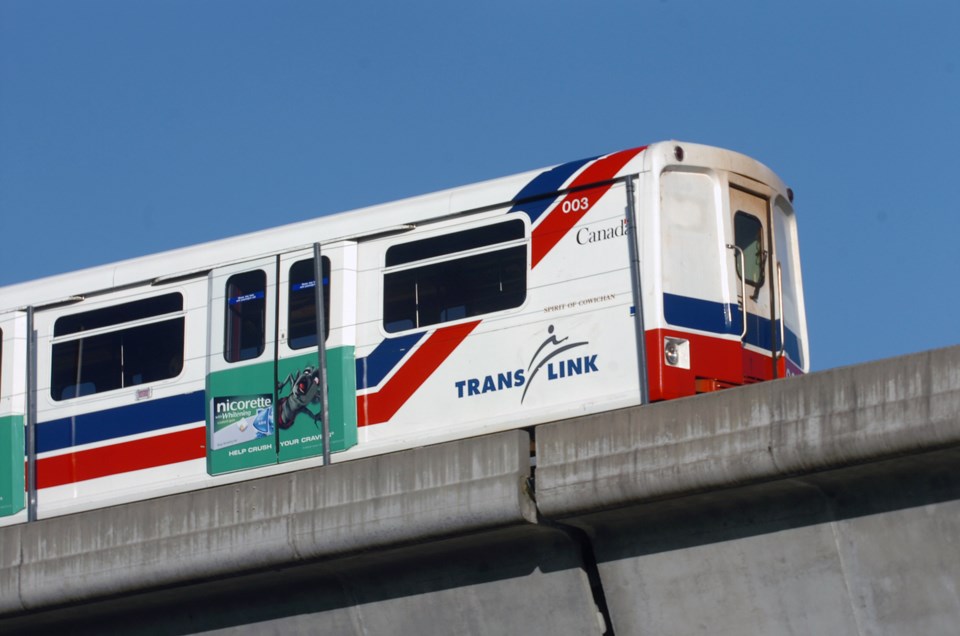The City of New Westminster wants to connect with as many residents as it can to promote a Yes vote in the upcoming transportation referendum.
The Mayors’ Council on Regional Transportation is seeking a 0.5 per cent increase to the provincial sales tax to generate funding to expand the regional transit and transportation system. Its 30-year vision includes plans for a new tolled four-lane Pattullo Bridge, new light rail transit lines in Surrey, an extension of the Millennium Line along the Broadway corridor to Arbutus, a 25 per cent increase in bus service, maintenance and upgrades to the 2,300 kilometres of the region’s major road network to keep vehicles and goods moving, and expansions to SeaBus service, HandyDart service, West Coast Express and existing SkyTrain lines.
“I think this is a very, very important referendum,” said Coun. Bill Harper. “I wouldn’t want to guess what happens if it doesn’t pass.”
The city fears the region’s transit and roads will suffer if the referendum is rejected, and a replacement for the Pattullo Bridge could be at risk. Harper said the city should have a brainstorming session to plan how it can mobilize a Yes vote and motivate people to vote in the mail-in referendum.
Mark Allison, the city’s manager of strategic initiatives and sustainability, said the referendum will be conducted by a mail-in vote between March 16 and May 29.
On Monday, council endorsed the Mayors’ Council’s 30-year transportation vision and 10-year investment plan, supported a Yes vote and campaign in the regional referendum on transportation financing and directed staff to implement a communication plan to encourage New West residents to vote in favour of the vision and plan. The city will also consider how to increase registration to ensure as many people are registered to vote as possible.
“The council as a whole has unanimously agreed to support the TransLink referendum and put forward a campaign for that,” said Mayor Jonathan Cote. “I think there is a number of cities in Metro Vancouver that are all going down a similar path, where they are saying ‘we really need this, this is a benefit to our city and the region as a whole’ and are actually coming out and saying, ‘we as a council are going to support that’. New West added our name to the list.”
The City of New Westminster’s communications plan could include information on the city’s website, social media, presentations to residents’ associations, ads on digital signs in the city, circulation of promotional materials developed by Yes coalition partners, temporary displays/kiosks at high traffic locations, meetings with community groups and an open house or townhall meeting.
Coun. Chuck Puchmayr said many people have stated that transportation planning will be set back by decades if the referendum is defeated, as it provides a way to fund future road and transit improvements. If the referendum fails, he said New Westminster will continue to face increased “fugitive traffic” that passes through the city even though its destination is elsewhere.
Puchmayr said the No side of the referendum will be a “real force,” so the city needs to participate in a campaign to promote a Yes result.
Coun. Patrick Johnstone said the referendum means more to New Westminster than a replacement for the Pattullo Bridge, as it would also include funding for more SkyTrain cars and buses, which would result in better service. He noted that New Westminster has already seen two bus routes reduced – at a time when the population is growing.
“We do need this to pass,” he said.
Johnstone said it’s imperative that action be taken to ensure that as many people vote as possible. He suggested that could include a campaign at SkyTrain stations to make sure people who use transit are registered to vote.
Coun. Jaimie McEvoy also expressed concern that many people may not get the ballot and vote because the mail-in ballots will be sent to registered voters. He pointed out that 80 per cent of renters have moved in the past three years. McEvoy fears the referendum is set up to lose without giving people the full opportunity to participate.
“The referendum is going to be a mail-in ballot. Unfortunately, when you rely on mail-in ballots, if you are dealing with a population that moves more frequently, whether that be renters, lower income or event students, some people end up being disenfranchised through that process. Those are the demographics we actually think are probably going to be most supportive and public transit is most important to,” Cote told The Record. “I think there is some legitimate concern that this referendum might miss some people whose voices really need to be heard.”
Lisa Spitale, chief administrative officer, said staff will report back to council with a budget for a Yes campaign and a plan for dealing with non-registered voters.



